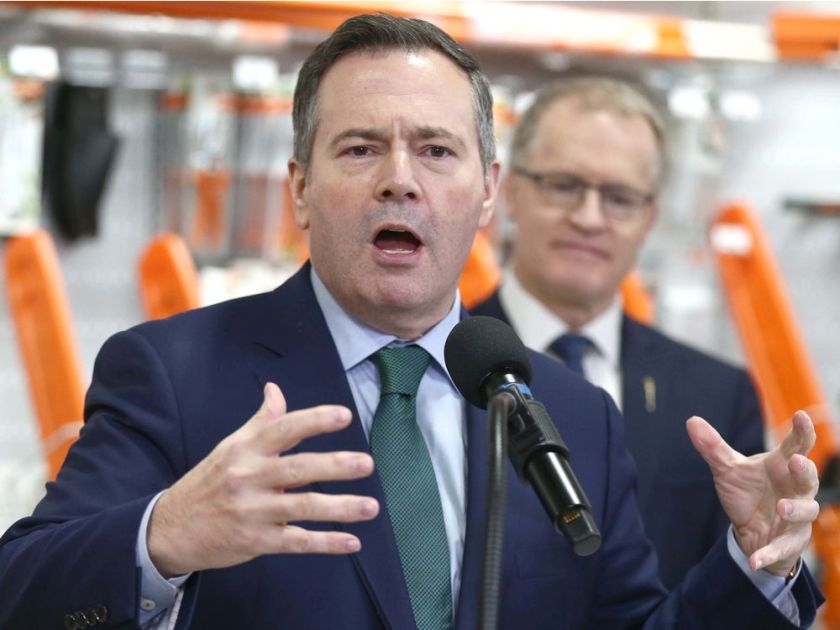Alberta Premier Jason Kenney gestures as he speaks at Arn’s Equipment in Calgary on Tuesday, January 21, 2020. Kenney and Associate Minister Grant Hunter (R) spoke regarding red tape reduction a long time local business.
In the weeks leading up to the American election in 2016, many of my friends, relatives, and colleagues spoke rather smugly of Canada’s political culture compared with the U.S. The idea that people would elect a narcissistic, misogynistic, con man as president seemed beyond the pale. But they did.
Were Donald Trump merely a clown, one easily tossed back in the toy box after four years, the damage would have been severe, but not fatal. The U.S. has had its share of lousy leaders. But the meaning of the Trump years goes deeper than that.
The Trump presidency is not merely about lying — every president in my lifetime has spoken lies — some small, some whoppers; nor is it about self-aggrandizement — every recent president, save Jimmy Carter, has left office wealthier; nor is it even about carrying out illegal activities, including tramping on the rights of citizens.
Sadly, as reprehensible as these actions are, they fall within the ambit of “normal” politics. At the end of the day, however, the combatants — Republican and Democrat — have always returned to their corners, knowing that the Marquis of Queensberry rules, though shopworn and frayed, still obtain.
But Trump has changed that. Not satisfied with deceit, self-dealing, and criminality, Trump has slowly but surely changed the conventional rules. Raising himself up as the people’s saviour, he has gutted the idea of “checks and balances” on the executive — how dare the other branches question the swamp-drainer?
He, too, has all but abolished the need to obtain from Congress approval to wage war, arrogating to himself, delivered by button or a 3:00 a.m. tweet, the kingly right to kill. Finally, while railing against illegal immigrants and others he deems insufficiently patriotic, he has bribed, cajoled, or threatened foreign governments to interfere in American politics for his own political gain.
Success breeds success. As there is a reasonable chance that Trump will be re-elected in November, the new normal he has presided over has already spawned copycats around the globe. Fortunately, to date, Trumpian politics has largely bypassed Canada. In the years to come, we may take solace in a continuance of traditional politics in the form of bad, incompetent, and sometimes corrupt governments, at all levels and stripes. In one province, however, a Trump-like push towards a new authoritarianism is being served: Alberta.
Riding a wave of populist hate and anger, the United Conservative Party of Jason Kenney, has since the spring 2019 election, been bending and changing the rules of normal political practice. Kenney does not emulate Trump’s style, of course. He is a more practised speaker, less given to off-the-cuff rants, but no less calculating in his aims.
Consider that, in only its few months in office, the UCP has: fired the province’s elections commissioner — in the midst of an investigation into illegal activities during the premier’s leadership race — and tacitly threatened the independence of the office of Alberta’s chief electoral officer; established, partly out of public funds, a secretive and unaccountable organization, the Canadian Energy Centre, to attack those the government identifies as enemies; more generally fostered an environment of fear and anger directed at individuals and groups similarly singled out by the government as “un-Albertan;” through the budgetary process, threatened the survival of numerous civil society organizations; similarly, hamstrung the ability of municipal governments to function; threatened the independence of a host of bodies, including universities and colleges, and the Alberta Teachers’ Association; and made direct attacks on the Charter-protected rights of unions to collective bargaining.
Viewed in totality, the UCP’s actions betray a singular theme: the centralization of power around an increasingly secretive, smaller but privatized government — that is simultaneously a Big State — which seeks to ensure that nothing happens without its say. The Kenney government is doing this in the name of defending the people — a nebulous group to whom one may belong at one moment, an outcast the next.
Ultimately, the UCP’s actions are designed for one purpose: to politically threaten, financially cripple, and bring to heel any individual or group that dare stand against it. In very Trumpian fashion, the UCP is subtly — or not so subtly — trying to bring about a new normal of authoritarian rule. Albertans of all political persuasions should be concerned.
Trevor W. Harrison
